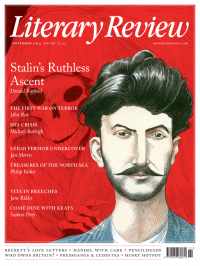John Bew
Chaos Theories
Phantom Terror: The Threat of Revolution and the Repression of Liberty 1789–1848
By Adam Zamoyski
William Collins 569pp £30
‘Everything has changed in our civilisation; it has made much fortunate progress, but it has also left us some new vices’, wrote Joseph Fouché, Napoleon’s former police chief, with some pessimism, after the Battle of Waterloo in 1815. It was ‘no longer possible to govern men in the same manner’, he feared, and he was not the only one to have such concerns. Across Europe, a whole generation of the political and social elite was permanently scarred by the events of the French Revolution and its aftermath. Long after the defeat of Napoleon, these elites remained terrified by the prospect of disorder, radicalism and anarchy. In this elegant and panoramic survey of Britain, France, Germany, Austria and Russia, Adam Zamoyski explores this state of terror using a wide selection of manuscript sources, state papers, diplomatic correspondence and diaries. These abound ‘in imagery of volcanic eruption engulfing the entire social and political order’ and express ‘an almost pathological dread that dark forces were at work undermining the moral fabric on which that order rested’.
Some of these dangers were genuine. Other threats – such as the activities of Carbonari, secret societies and Freemasons – were deliberately inflated in order to provide governments with the pretext for repression. This ‘phantom terror’ had domestic political implications throughout Europe; even Britain succumbed to the reactionary impulse after

Sign Up to our newsletter
Receive free articles, highlights from the archive, news, details of prizes, and much more.@Lit_Review
Follow Literary Review on Twitter
Twitter Feed
It wasn’t until 1825 that Pepys’s diary became available for the first time. How it was eventually decrypted and published is a story of subterfuge and duplicity.
Kate Loveman tells the tale.
Kate Loveman - Publishing Pepys
Kate Loveman: Publishing Pepys
literaryreview.co.uk
Arthur Christopher Benson was a pillar of the Edwardian establishment. He was supremely well connected. As his newly published diaries reveal, he was also riotously indiscreet.
Piers Brendon compares Benson’s journals to others from the 20th century.
Piers Brendon - Land of Dopes & Tories
Piers Brendon: Land of Dopes & Tories - The Benson Diaries: Selections from the Diary of Arthur Christopher Benson by Eamon Duffy & Ronald Hyam (edd)
literaryreview.co.uk
Of the siblings Gwen and Augustus John, it is Augustus who has commanded most attention from collectors and connoisseurs.
Was he really the finer artist, asks Tanya Harrod, or is it time Gwen emerged from her brother’s shadow?
Tanya Harrod - Cut from the Same Canvas
Tanya Harrod: Cut from the Same Canvas - Artists, Siblings, Visionaries: The Lives and Loves of Gwen and Augustus John by Judith Mackrell
literaryreview.co.uk